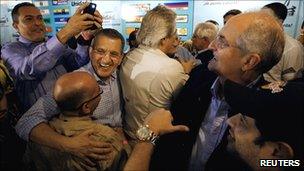Chavez foes advance in election
- Published

There were broad smiles among members of the opposition MUD as the results were announced
The Venezuelan opposition has performed well in elections, overturning President Hugo Chavez's two-thirds majority in parliament.
Mr Chavez's United Socialist Party (PSUV) still won a majority of seats in Sunday's poll, but will now be unable to pass major legislation unaided.
The poll was seen as a test of Mr Chavez's popularity ahead of presidential elections in 2012.
An opposition spokesman said he was "very happy" with the results.
The opposition umbrella group he represents, the Table for Democratic Unity (MUD), will now become an important bloc in the parliament, says the BBC's Will Grant in Caracas.
It will be capable of thwarting some of Mr Chavez's key socialist reforms, be they appointments to the Supreme Court or backing for sweeping new laws.
It seems Mr Chavez will now have to find some way to work with the opposition representatives in parliament, our correspondent adds.
Opposition gains
Opposition parties boycotted polls in 2005 - allowing Mr Chavez's party to sweep up almost all the seats in parliament - so they were almost certain to make some gains.
Electoral authorities announced that the PSUV won at least 94 seats, and the MUD at least 60 - surpassing the key target of 55 required to overturn the PSUV's two-thirds majority.
A third party won another two, three seats went to indigenous parties and the remaining six in the 165-member National Assembly were yet to be decided.
The MUD also claims that it actually won an overall majority - 52% - of votes cast, but that changes to electoral districts and voting rules prevented that being translated into parliamentary seats. However, the breakdown of the popular vote has not been confirmed by the National Electoral Council.
"This gives us a lot of political power," said Armando Briquett, a MUD spokesman, according to Reuters news agency. "We are very happy."
But in a message to his followers on Twitter, Mr Chavez declared the result a "new victory by the people. I congratulate you all."
Crime and inflation
The results were only announced several hours after polls closed, despite an automated voting system supposed to supply results quickly - prompting the opposition to accuse electoral officials of stalling.
But election officials - who put turnout for the poll at 66% - put the delay down to a number of tight races.
The opposition focused its election campaign on rising crime and rising inflation.
With this electoral advance it will now become a more important force, our correspondent says.
However, the new parliament will not convene until early January, leaving Mr Chavez three months to push through any key reforms.
<link> <caption>BBC Mundo</caption> <url href="http://www.bbc.co.uk/mundo/" platform="highweb"/> </link>
- Published25 September 2010